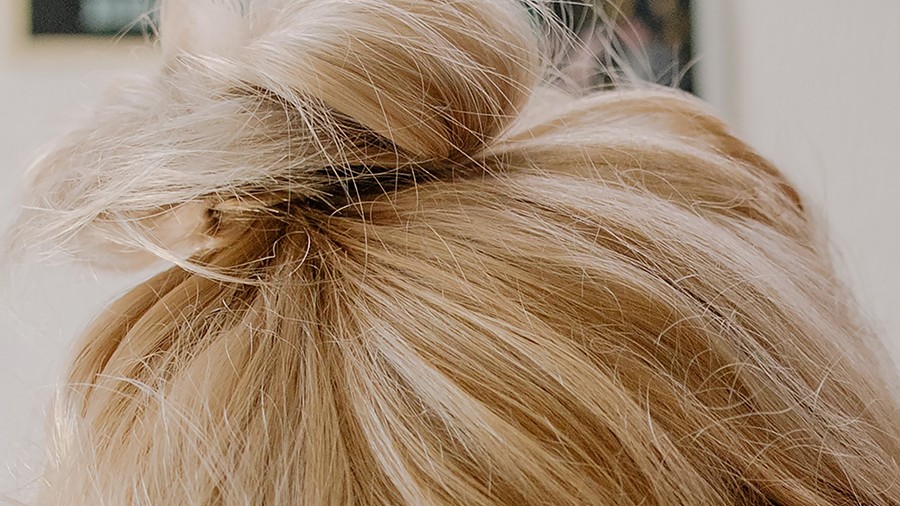Formulate user Grace wants to know what's up with oil training:
I've had oily hair my entire life. But I've also always been a shower-every-day person, and I grew up washing my hair every time that I showered. My hairstylist told me that if I did this thing called oil training I would experience less grease overall. She said that washing daily is making it worse, which is really confusing to me because the few times I've skipped washing my hair for a few days I've looked like someone just poured a bucket of oil on my head. So is it true that going a few days without washing will actually help over time, or should I just stay with washing daily?
Thanks for your question, Grace!
Before we go further, let's first get a working definition of oil training. Oil training is an effort to "train" the scalp to be less oily, so that you can go longer without washing your hair. It involves three critical things:
- Getting rid of products that dry out your hair, such as harsh, sulfate-based shampoos.
- Washing your hair less often than you currently do (the exact hair washing schedule varies from person to person. Some people switch to washing two or three times a week, and others eventually switch to washing only a couple times a month.)
- Using only gentle, moisturizing products to clean your hair, like sulfate-free shampoos and cleansing conditioners.
So that's all great in theory, but will oil training actually do anything to make your scalp produce less sebum? And, just as important, are there any risks to you or your hair?
To learn more, we spoke with Dr. Anna Chacon, board-certified dermatologist and trichologist.
Formulate: Is oil training hair a real thing -- will it actually help you to have less oily hair long-term?
Dr. Chacon: For some people, yes, it seems that oil training may help regulate the oil production of the scalp in the long term.
Formulate: So it's not a one-size-fits-all foolproof trick. Good to know! So, when it seems that oil training is helping, how often is it the oil training that's working, instead of something else? For example, does it happen that someone just thinks that their hair looks less oily because they want to think it looks less oily?
Dr. Chacon: Sometimes it does have a placebo effect and does not make much of a difference.
Formulate: Okay, good to know. Are there any people in particular that oil training is especially good for?
Dr. Chacon: Oil training may be helpful for women who have very oily hair and are hoping to regular the oil balance in their scalp.
Formulate: Is there anyone who it won't really work for?
Dr. Chacon: Most people can tolerate oil training. However, I would not recommend it in an individual suffering from a scalp condition.
Formulate: Makes sense. So let's say that someone is really pushing their hair to go as far as a whole month without washing. How would that person know when to stop training, and just stick to a certain hair washing schedule?
Dr. Chacon: Oil training should be stopped when you are not satisfied with how your hair looks or if it becomes uncomfortable to walk around in that state. Sometimes having hair that is too oily looks and feels unpleasant.
Formulate: Totally. And beyond feeling unpleasant, are there any dangers of oil training for that long a period of time?
Dr. Chacon: Large amounts of sebum tend to produce a smell of the scalp. They can also lead to scaling, flaking and dandruff on the scalp. It also tends to lead to a breeding ground for scalp disorders if poorly controlled or if too oily.
Formulate: Oh, that sounds like something you'd want to avoid. Can you un-train your hair? For example, let's say you used to wash once a week, but you switch to twice a week -- will your hair go back to getting greasy more quickly than when you were washing once a week?
Dr. Chacon: Yes, you may untrain the hair by washing more frequently if desired. This may alter the oil regulation of the scalp depending on hair washing frequency.
Formulate: Anything else our readers should know about oil training?
Dr. Chacon: Remember that your environment affects how often you will want to wash your hair. For example, in a desert environment with lower humidity, less hair washing is needed than in a more humid environment in which the hair retains more moisture.
Looking for more haircare info? Here's what's next:
How To Go Back To Your Natural Hair Color
How to ditch the artificial color and go all-natural with your hair
Shag Haircut 101
Your guide to cutting and styling the shag haircut of your dreams
Salon Wash Techniques: Why Is Wash Day SO Much Better At The Salon?
Is it possible to have your own salon experience at home?
Waist Length Hair: Is It Attainable For You?
Time to rock some mermaid hair 🧜♀️
Finding The Right Hair Colors For Your Skin Tone
A handy-dandy guide to finding the right color for you.


